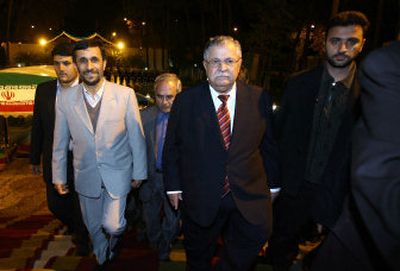Iraq looks to Iran for help

BAGHDAD, Iraq – Iraq’s president turned to Iran on Monday for help to stem the bloodshed, and Iraqi officials said talks this week between President Bush and Prime Minister Nouri al-Maliki will focus on giving Iraqis more control so U.S. forces can withdraw.
“We are in dire need of Iran’s help in establishing security and stability in Iraq,” Iran’s state-run television quoted Iraqi President Jalal Talabani as saying after he met with Iranian President Mahmoud Ahmadinejad in Tehran.
The increased pace of diplomacy comes as a bipartisan U.S. panel headed by former Secretary of State James A. Baker III and former Rep. Lee Hamilton is expected to put forth recommendations soon to the White House on alterations to Iraq policy. Seeking help from Iran and Syria was believed to be among the Iraq Study Group’s proposals following American elections and calls for a speedy U.S. withdrawal.
Looking ahead to the Bush-Maliki summit in Amman, Jordan, the Iraqi side viewed the talks as the most important between leaders of the two countries since the ouster of Saddam Hussein, according to the two top officials with intimate knowledge of planning for the Wednesday-Thursday meeting.
Iraqi officials believe the summit will deal with giving Iraqi forces more control over security. The Iraqis expect President Bush to agree to such an arrangement, and they say al-Maliki will then ask for the Americans to start discussing a timetable for the withdrawal of U.S. troops, according to one of the officials, who spoke on condition of anonymity because of the sensitive nature of the information.
But Bush’s national security adviser, Stephen Hadley, said it was unlikely Bush would address with the Iraqi leader the issue of any U.S. troop withdrawals. “We’re not at the point where the president is going to be in a position to lay out a comprehensive plan,” Hadley told reporters aboard Air Force One.
The second Iraqi official, who spoke anonymously for the same reason, said American officials had indicated in preparatory talks in Baghdad that Bush was open to increasing the pace of the security hand-over.
“The responsibilities of U.S. troops will decrease when security is transferred to Iraqis, and that will mean the Americans have more soldiers here than they need,” the second official said.
Also on the Iraqi agenda, the officials said, would be al-Maliki’s insistence that the United States pressure its Sunni Arab allies in the region to stop what Baghdad claims is support for the insurgency.
Lastly, al-Maliki wants to get an outline of the U.S. view of the strategic relationship that would exist as the Americans draw down their presence in the country, the Iraqi officials said.
Hadley said the conflict in Iraq had entered “a new phase” requiring changes.
“Obviously, everyone would agree things are not proceeding well enough or fast enough,” he said. “We’re clearly in a new phase characterized by an increase in sectarian violence that requires us to adapt to that new phase.”
Bush and al-Maliki “need to be talking about how to do that and what steps Iraq needs to take and how we can support” Iraq’s leaders, Hadley said, rejecting suggestions that Iraq had already spiraled into a civil war.
As the summit approached, Britain said on Monday it expected to withdraw thousands of its 7,000 military personnel from Iraq by the end of next year, and Poland and Italy announced the impending pullout of their remaining troops.
The Iraqi officials said they expected al-Maliki would brief Bush on the outcome of Talabani’s meetings with Ahmadinejad.
Al-Maliki also was expected to explain his thoughts on how Syria, Iraq’s western neighbor, could play a role in calming violence. Al-Maliki lived in exile in Syria during Saddam’s rule.
Hadley said he believed that al-Maliki – rather than Bush – seemed more likely to bring up the subject of dealing with Iran and Syria, saying the Iraqi leader had strong views on the subject.
Jordan’s King Abdullah said Sunday the problems in the Middle East go beyond the war in Iraq and that much of the region soon could become engulfed in violence unless central issues are addressed quickly.
“We could possibly imagine going into 2007 and having three civil wars on our hands,” he said, citing conflicts in Iraq, Lebanon and the decades-long strife between Palestinians and Israelis.
Key players in those conflicts are Syria and Iran, which has a major influence over fellow Shiites in Iraq, including the Shiite-led government.
The meeting between Talabani and Ahmadinejad, which was delayed for two days because of a security clampdown in Iraq, provided Tehran an opportunity to try to assert its role as the top regional power broker to counter Washington’s influence on Baghdad.
During their talks, Ahmadinejad pledged Tehran’s support in helping to improve security in Iraq.
Iran’s potential for heavy influence in Iraq is particularly troubling to the Bush administration. Many in Iraq’s new Shiite-dominated power structure have deep ties to Iran, and many of the key players spent considerable time in exile in Iran during Saddam’s rule. The two main Shiite militias in Iraq are believed to rely heavily on Iran for training, funding and weapons.
The United States has been estranged from the Shiite theocracy that has run Iran since the pro-U.S. shah was toppled nearly three decades ago, and the difficult relationship has only worsened as Washington accuses Iran of trying to develop nuclear weapons in disregard of the Nuclear Nonproliferation Treaty.
Thus, inviting Iran to become a formal player in an attempt to quell violence in Iraq would be an extraordinarily delicate diplomatic maneuver for the White House.
It faces the same problem with Syria, which the United States has basically shunned in recent years, especially since the assassination of former Lebanese Prime Minister Rafik Hariri. Syrian agents have been implicated in that crime and the U.S. has pointed to Damascus in the killing last week of another anti-Syrian Lebanese leader, Industry Minister Pierre Gemayel.